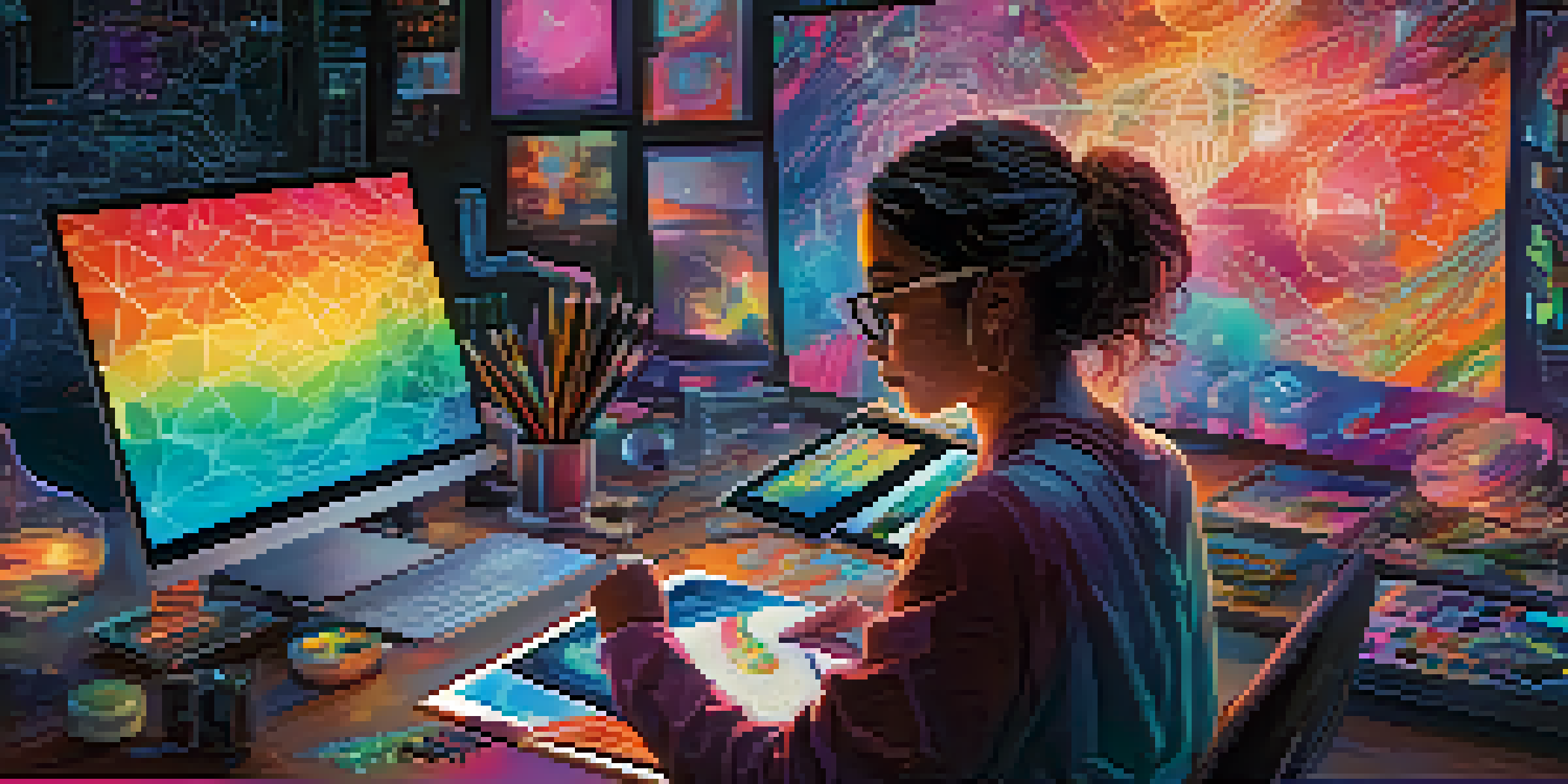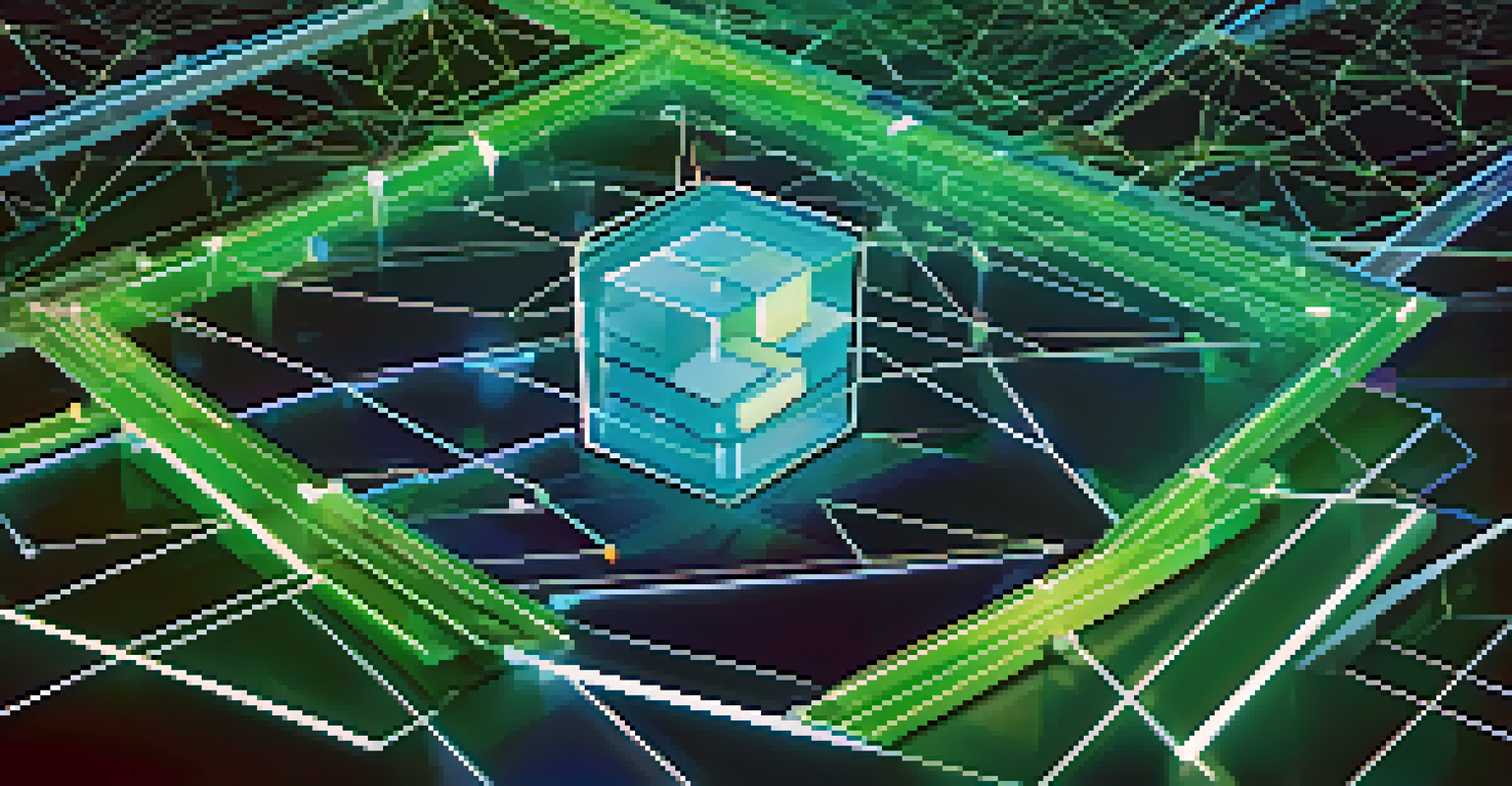The Impact of Blockchain on Content Distribution for Creators

Understanding Blockchain and Its Core Features
Blockchain is a decentralized digital ledger that records transactions across many computers. This technology ensures that the recorded information cannot be altered retroactively without the alteration of all subsequent blocks, which adds a layer of security and transparency. Essentially, it allows for trustless transactions, meaning creators can share their work without needing a middleman.
Blockchain is the technology that can give power back to the people, and create a fairer world for all.
For content creators, this is a game-changer. Imagine being able to distribute your art, music, or writing directly to your audience without worrying about platforms taking a hefty cut. Blockchain enables artists to retain more control over their work and profits, leading to a more equitable distribution model.
Moreover, the transparency of blockchain means that creators can track how their content is being used and monetized. This kind of insight can empower them to make informed decisions about their distribution strategies and collaborations.
How Blockchain Enhances Copyright Protection
One of the biggest challenges creators face is protecting their intellectual property. Traditional copyright systems can be cumbersome and often fail to provide adequate protection. However, blockchain offers a novel solution by allowing creators to register their work on a decentralized ledger, establishing a clear and immutable record of ownership.

This means that if someone uses a creator's work without permission, there is a verifiable proof of ownership that can be used in disputes. By leveraging blockchain, creators can assert their rights more effectively, reducing the instances of copyright infringement and unauthorized use.
Blockchain Empowers Creators
Blockchain technology allows creators to distribute their work directly to audiences, enhancing control over profits and ownership.
Furthermore, innovative concepts like smart contracts can automate licensing agreements, ensuring that creators receive payment instantly when their work is used. This not only saves time but also enhances the likelihood that creators will be compensated fairly for their contributions.
Tokenization: New Revenue Streams for Creators
Tokenization is the process of turning a creator's work into a digital asset through blockchain. This can include anything from music tracks and e-books to visual art pieces, allowing creators to sell their work directly to fans as unique tokens. This approach opens up new revenue streams that were previously unavailable to many artists.
The future is already here – it's just not very evenly distributed.
For example, musicians can sell limited edition tracks as non-fungible tokens (NFTs), creating scarcity and driving demand. Fans who purchase these tokens not only get exclusive content but also a sense of ownership that traditional distribution methods rarely offer.
Additionally, tokenization allows creators to engage with their audience in a more meaningful way. By offering tokens, creators can build a community around their work, encouraging fans to support them directly rather than relying solely on ad revenue or sponsorships.
Decentralized Platforms: Empowering Creators
The advent of blockchain has led to the emergence of decentralized content platforms that prioritize creator rights. Unlike traditional platforms that control distribution and monetization, decentralized platforms empower creators by giving them direct access to their audience. This shift is significant for artists seeking autonomy over their work.
On these platforms, creators can showcase their content without gatekeepers deciding what gets published. This democratization of content distribution allows for a wider variety of voices and perspectives to be heard, enriching the creative landscape.
Enhanced Copyright Protection
By registering works on a decentralized ledger, creators can establish clear ownership, reducing copyright infringement and unauthorized use.
Moreover, decentralized platforms often have built-in mechanisms for fair compensation. This means creators can earn a more significant share of the revenue generated from their work, leading to a more sustainable model for creative industries.
Building Authentic Connections with Fans
Blockchain technology not only transforms financial transactions but also fosters deeper connections between creators and their audiences. By using blockchain, creators can offer fans unique experiences, such as exclusive access to behind-the-scenes content or early releases of new projects. This level of engagement can strengthen the bond between creators and their supporters.
For instance, by issuing tokens, creators can reward loyal fans with special perks, such as personalized messages or invitations to virtual events. These interactions create a community where fans feel valued and appreciated, ultimately driving more support for the creator's work.
Furthermore, this direct connection can lead to more substantial fan investment in a creator's journey. When fans feel personally connected, they are more likely to share the creator's work, further expanding the reach and impact of the content.
Challenges and Considerations in Blockchain Adoption
Despite its potential, the adoption of blockchain in content distribution is not without challenges. One of the primary concerns is the complexity of the technology itself. For many creators, understanding how blockchain works and how to navigate platforms can initially feel overwhelming.
Additionally, there are concerns about the environmental impact of certain blockchain technologies, particularly those that rely on energy-intensive mining processes. As awareness of sustainability grows, creators may hesitate to adopt solutions that could conflict with their values.
New Revenue through Tokenization
Tokenization transforms a creator's work into unique digital assets, opening up new revenue streams and fostering deeper fan engagement.
Another challenge is the regulatory landscape surrounding blockchain and digital assets. Creators must stay informed about the legal implications of using blockchain to ensure compliance and protect their interests. However, as the technology matures, these challenges are likely to be addressed, paving the way for broader adoption.
The Future of Content Distribution with Blockchain
The future of content distribution is poised to be significantly shaped by blockchain technology. As more creators and consumers recognize the benefits of decentralization, we can expect an increase in the number of platforms and tools designed specifically for this purpose. This shift could lead to a more vibrant and diverse creative ecosystem.
Moreover, as blockchain continues to evolve, new innovations will likely emerge, further enhancing how creators share and monetize their work. Concepts like decentralized autonomous organizations (DAOs) may provide creators with even greater control and collaborative opportunities.

Ultimately, the integration of blockchain into content distribution holds the promise of a more equitable landscape where creators are empowered to succeed on their terms. This transformation could redefine how we think about creativity, ownership, and value in the digital age.